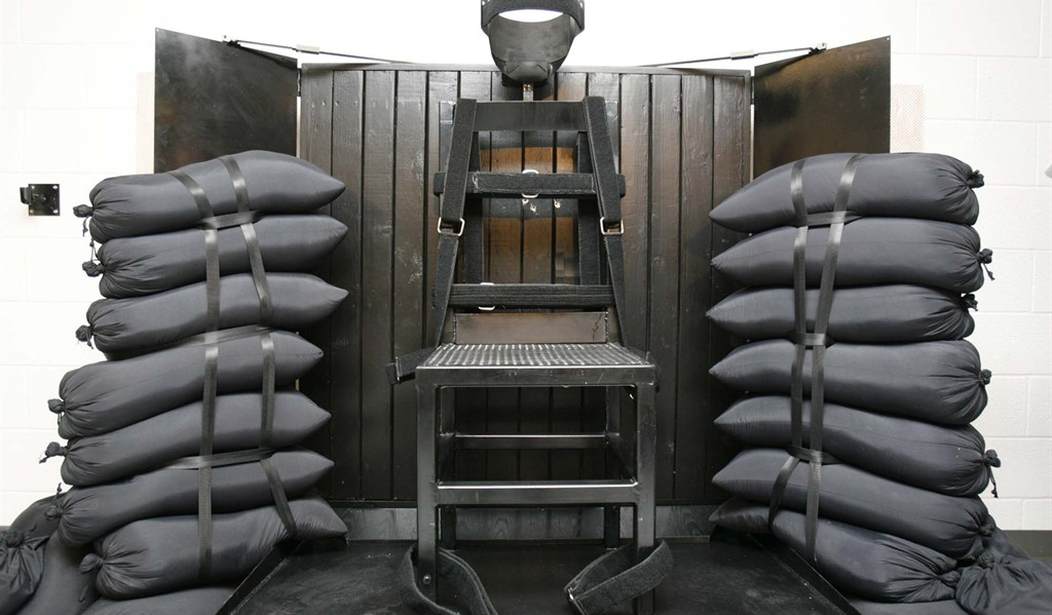Lawyers for executed murderer Mikal Mahdi claimed his execution was "botched" in a report filed with the South Carolina Supreme Court. Mahdi, who became the second prisoner executed by firing squad (see South Carolina Executes Murderer by Firing Squad – RedState) in South Carolina on April 11, allegedly did not die instantaneously. An AP report filed after the execution contended that he was alive for about two minutes after the fatal shots were fired.
He cried out as the shots hit him, and his arms flexed. A white target with the red bull’s-eye over Mahdi’s heart was pushed into the wound in his chest.
He groaned two more times about 45 seconds after that. His breaths continued for about 80 seconds before he appeared to take one final gasp.
A doctor checked him for a little over a minute, and he was declared dead at 6:05 p.m., less than four minutes after the shots were fired.
Mahdi carried out a week-long, three-state crime spree in July 2004 during which he killed three men. The murder that sent Mahdi to death row was that of retired Orangeburg, South Carolina, police captain James Myers. He burglarized Myers's home, shot Myers when he returned to the residence, and then burned the body.
There are two subplots to the complaint.
First, anti-death penalty lawyers have pushed hard to create a doctrine that says executions must produce instantaneous, painless deaths. Otherwise, they are "botched" and illegitimate. The strategy is to convince fellow-traveling judges to rule that the possibility of a "botched" execution is, by definition, a violation of the Eighth Amendment's prohibition against "cruel and unusual punishment." This is obviously hogwash, as that prohibition applies to punishments designed to inflict pain.
In 1947, Louisiana attempted to execute Willie Francis via its traveling electric chair. A drunk technician improperly wired the device (Louisiana, go figure), and Francis survived the attempt. The Supreme Court ruled that the Eighth Amendment did not apply and the state was entitled to another go, and this time, it was successful.
Things change, and our imperial judiciary has expanded the clear meaning of the Eighth Amendment into something no one would have conceived at its drafting. Perhaps the most notorious example of this is Michael Rupe, who was sentenced to death in Washington but found to be literally too fat to hang. Rupe ballooned himself up to over 400 pounds while on death row and then argued that hanging would most likely result in his decapitation. The fact that Mahdi lingered a bit, and perhaps had time to contemplate the error of his ways, before shuffling off this mortal coil will be used to attack the firing squad as a means of execution.
Second, there are insinuations that the execution may have played out the way the members of the firing squad intended. All the rounds missed Mahdi's heart, though bullet fragmentation did cause some injury to that organ.
"Mikhal's heart was left almost completely intact," [Mahdi's attorney David] Weiss told NBC News, indicating that was the cause of in the inmate's prolonged death. "That's not to say that it was missed entirely."
Most curiously, there were only two entrance wounds in the body, but three shots were fired. The Department of Corrections spokeswoman said that this was due to two bullets hitting the same spot, and it has happened before on test runs. While not ready to throw the bull**** flag on this story, but relying on my four years as a member of my college rifle team (yes, we used to have those) and many more years teaching basic rifle marksmanship, I'd contend that even though two rounds through the same hole does happen on a rifle range, there is a huge difference between one man shooting several rounds at a target and three men shooting precisely one round each into a human. When one considers that Mahdi tried to kill a corrections officer during a 2009 escape attempt, some degree of payback, rather than universally bad marksmanship, might be a better explanation. I'm sure that eventually one of the pathologists involved in this case will get around to weighing bullet fragments, and we'll solve the mystery of the missing bullet.
I don't think Mahdi's lawyer will find particularly fertile ground in the South Carolina Supreme Court for outlawing the firing squad for a psycho killer whose execution wasn't letter perfect, but we probably haven't heard the last of this case.
RedState is your leading source for news and views on administration, politics, culture, and conservatism. If you like our reporting and commentary, please become a member and support our efforts. Use promo code FIGHT to get 60% off your membership.














Join the conversation as a VIP Member